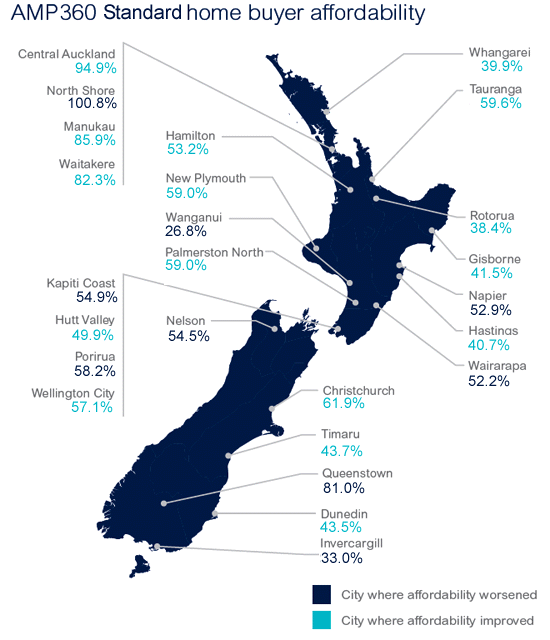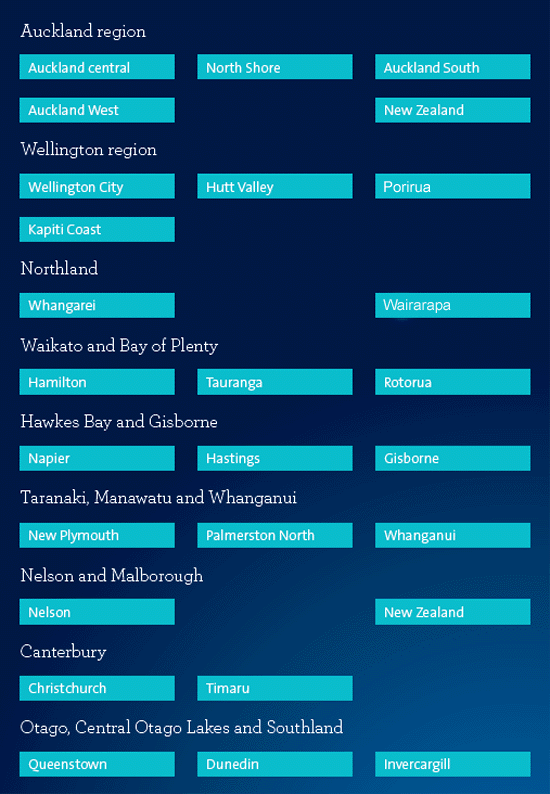
Home loan affordability improved by 4% last month compared with December, according to the latest AMP360 Home Loan Affordability Report.
The improvement was driven mainly by a fall in fixed term mortgage rates, with the average two year fixed rate dropping from 5.97% to 5.89%, while the REINZ's median house price fell from $450,000 in December to $426,000 in January.
That would have reduced the weekly mortgage payments for a typical home buyer to $501.13 compared with $533.19 in December.
There was also relief for first home buyers in January, with the REINZ's lower quartile house price dropping to $287,500 from $305,000 in December.
That would have reduced the weekly mortgage payments for a typical first home buyer to $374.26 a week compared with $402.97 a week in December.
"There have been some significant movements in home loan rates recently but the headline rates often have special conditions attached to them which may not suit everyone. Our mortgage advisers can help borrowers ensure they get the best deal that is most suited to their needs," AMP360's national manager Paul Gardiner said.
However in spite of the improvement in affordability in January, housing was still significantly less affordable than it was a year ago, due to the fact that house prices have risen more quickly than interest rates have declined.
The AMP360 Home Loan Affordability Report showed that in January this year, mortgage repayments would have taken 60.3% of the after tax pay of a typical buyer on a median income compared with 57.4% in January 2014 and 53.6% in January 2013.

For a typical first home buyer purchasing a home at the lower quartile price point, their mortgage repayments would have taken 49.6% of their take home pay compared 47.9% in January 2014 and 45.8% in January 2013.
However there are considerable regional variations with Auckland the most seriously unaffordable place the country.
A typical first home buyer purchasing a home at the lower quartile price point in the Auckland region would have 93.7% of their after tax pay consumed by mortgage repayments.
Mortgage payments are considered unaffordable if they consume more than 40% of take home pay.
Of the 12 regions monitored in the report, only four of them - Hawkes Bay, Manawatu/Wanganui, Otago and Southland - remain affordable for typical first home buyers, with mortgage payments below 40% of take home pay.
However even in households where both adults work, housing would remain unaffordable, woith mortgage repayments consuming 42.5% of the median take home pay of a working couple based on the national median selling price.
To read the full AMP360 Home Loan Affordability report for typical home buyers, click in this link.
To read the full AMP360 Home Loan Affordability report for first home buyers, click in this link.

---------------------------------------------------------------------------------------------------------------------------------------
![]() Our free Property email newsletter brings you all the stories about residential and commercial property and the forces that move these huge markets. Sign up here.
Our free Property email newsletter brings you all the stories about residential and commercial property and the forces that move these huge markets. Sign up here.
To subscribe to our Property newsletter, enter your email address here. It's free.
----------------------------------------------------------------------------------------------------------------------------------------
No chart with that title exists.
3 Comments
Debt servitude is complete, banks now take 100% of an average persons income in Auckland to create modern day serfs. Think about that mortgaged Auckland people - the value of every bit of work you complete today goes into your banks pocket. Is it just me, or does something seem a bit wrong about this? Having finished the job on you, will the banks next demand their droit de seigneur with your significant other? Good luck with that.. Time for a new Magna Carta, in which it is shown that no-one, especially banks, should be above the law, nor should they be able to create their own laws at whim.
There is such a thing as 100.8% what is up with that?
It means you have to make double the median wage to afford to live there.

We welcome your comments below. If you are not already registered, please register to comment
Remember we welcome robust, respectful and insightful debate. We don't welcome abusive or defamatory comments and will de-register those repeatedly making such comments. Our current comment policy is here.